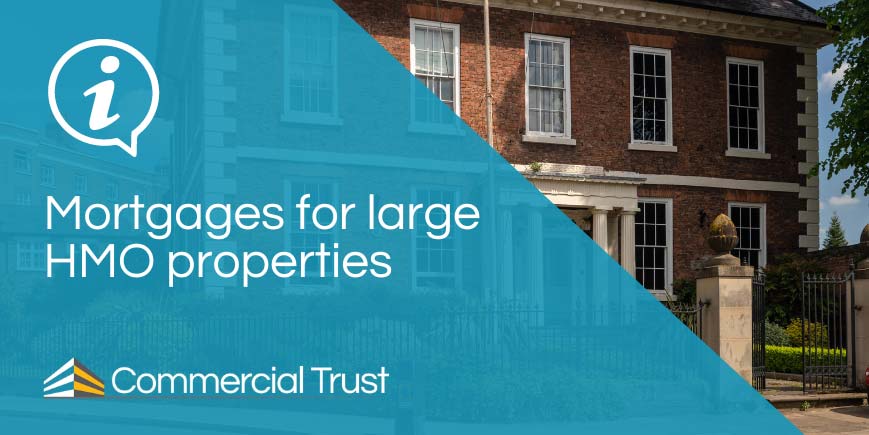This information should not be interpreted as financial, tax or legal advice. Mortgage and loan rates are subject to change.

Categories: buy to let mortgages | hmo | guides
A House of Multiple Occupation (HMO), also commonly known to tenants as a house share, is a property with multiple bedrooms but some shared facilities (e.g. lounge, kitchen, and bathroom) that can be rented to multiple tenants.
They are popular for their high yields and the fact that when a tenant leaves, there are still others paying rent, which softens the financial impact of a void.
To invest in one, where you do not have the full cash sum yourself, you will need an HMO mortgage.
But, should you invest in personal name (whether solely or jointly), or via a limited company or Special Purpose Vehicle? This guides addresses this subject and aims to answer some of the questions you may have.
Why might I consider incorporation?
Over the tax years 2017-2020 mortgage interest tax relief was phased out following the then chancellor, George Osborne announcing the move in the 2015 Summer Budget.
This tax cut impacted the profitability of renting property for landlords, as the relief was replaced with a flat tax credit, based on 20% of the interest paid on buy to let mortgages.
The change in tax meant that landlords who were higher rate taxpayers lost out on 40% tax relief on their mortgage interest payments. It also caused some landlords to move up a tax bracket, as they were having to declare more income from rent than was previously required.
This drove landlords to look at other ways to maintain profitability.
The tax laws for limited companies are different from those relating to personal income tax. For some this meant that incorporation helped retain a greater level of profitability.
When it comes to HMOs, by the nature of their size, it is not hard to imagine that landlords with one or more HMO in their portfolio are likely to be those who sit within a higher rate tax bracket. A bigger property typically costs more, so you have to have more income to afford them.
What is the difference between a limited company and an SPV?
SPV stands for “Special Purpose Vehicle”. This is a terms that relates to limited companies in general. It refers to a limited company being set up for a given reason. As an HMO landlord you would be setting up a limited company for the purposes of investing in property.
Limited companies are set up using a SIC code, which stands for Standard Industrial Classification code. There are a number of codes which relate to property investment.
You can technically invest in an HMO property, using a limited company already set up to do something else (for example, you may own your own business). However, mortgage lenders prefer it to be separate. As a result you will find your mortgage options are fewer if you want to apply through an already trading company.
Within the mortgage industry, this distinction is not typically referred to. Where limited company HMO mortgages are spoken about, it is expected that your company has been set up as an SPV specifically for property investment.
Limited company HMO mortgage criteria
The HMO mortgage criteria when buying through a limited company is no different to if you were investing in personal name. What’s more, there are very few HMO mortgage lenders who do not offer this applicant type/property type combination.
Limited company HMO mortgage rates are also broadly the same as any other HMO mortgage rate (albeit, as a more specialist property type, HMO mortgages in general have higher interest rates than a basic rental property).
So, when it comes to mortgage costs, there is no disadvantage to applying through a limited company.
Should I transfer my existing HMO’s into a company?
It is very important to be aware that if you want to incorporate your existing HMO properties, you will essentially be selling them to your limited company. This is because the legal entity owning the property will change.
Below we give you a few subjects to consider, but professional tax advice will be essential to understand the complete picture of your position.
Stamp duty
As a result (in England and Northern Ireland) Stamp Duty Land Tax (SDLT) is typically payable. Not only this, but it is charged on the market value of the property, rather than the chargeable consideration (price) the property is sold for.
So, you need to weigh up whether transferring your HMO property into a limited company, and the costs that will involve, is worth it compared to any potential tax benefits. It may be that at the very least it will take several years to recoup the cost, so your investment strategy will influence the decision.
Or, it may be that it makes better financial sense to keep your existing HMO’s in personal name ownership, but make any future purchases via a limited company.
Capital Gains Tax
When you sell your property to your limited company, you may pay Capital Gains Tax or, if you received shares in the company as payment for your properties, those shares may incur Capital Gains Tax when they are disposed of.
Mortgage costs
Whilst HMO mortgage interest rates do not tend to differ whether you apply in personal name or limited company name, you will need to change any mortgage on your HMO if you decide to transfer it into a limited company.
If you are within the initial rate period of your personal mortgage, and would have early repayment charges to pay to remortgage, you may want to wait until this time has passed.
If your HMO mortgage is with a lender who accepts applications through limited companies, speak to them about your plans. They may be comfortable with the fact that you are incorporating and be prepared to allow you to retain your existing mortgage, but this is less common.
Make sure you understand the position of your current lender well ahead of making any changes.
Bequeathing property
Where in the future you intend to gift your property in your will, there may be benefits to setting up a limited company as, rather than doing this it may be financially advantageous to make the beneficiaries directors of the company so that it would naturally pass to them on your death.
Should I buy future HMO property via a limited company?
You may find that the costs of transferring existing properties you own into a limited company is not cost effective. However, you may find that your tax advisor tells you that future purchases would be more tax efficient, if bought via a limited company.
A key benefit to incorporation is that limited companies can still offset mortgage interest costs against profits, when calculating tax owed.
Also, limited companies are charged Corporation Tax. At the time of writing this is set at 19%, where company taxable profits are less than £50,000 (for more detail around Corporation Tax rates see this page of the UK government website, if your business income is higher than £50,000 the tax rate is higher).
Individuals pay Personal Income Tax. In some situations paying Corporation Tax may mean your tax bill is less than if you pay Personal Income Tax.
If you are a basic rate taxpayer, you are charged 20% Personal Income Tax. This is a similar amount to small business Corporation Tax, so other costs may mean incorporating is not worthwhile for you.
But, if you are a higher rate taxpayer you are charged 40% Personal Income Tax, which is a lot higher than small business Corporation Tax. This may mean incorporating could reduce your tax bill.
How to decide which path to take
As you can see from the information above, the decision of whether or not to apply for an HMO mortgage via a limited company (SPV), or transfer existing HMOs into a limited company/SPV structure, has a lot to do with the financial benefits or costs related to tax.
Tax is a highly complex subject. So whilst it makes business sense to handle your tax affairs efficiently, it is vital that this is done properly and to the letter of the law.
Taking tax advice about your property/ies from a professional who has expertise in this subject is essential.
A conversation with a mortgage advisor will allow you to understand the costs involved with a limited company HMO mortgage, or remortgage, in the current marketplace.
To get accurate mortgage information, simply call our expert team on the number at the top of the page, live chat with our advisors, or request a call-back.



